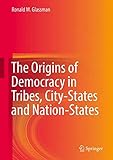The origins of democracy in tribes, city-states and nation-statesRonald M. Glassman.
Material type: TextPublication details: Cham : Springer, (c)2017.Description: 1 online resource (1721 pages)Content type:
TextPublication details: Cham : Springer, (c)2017.Description: 1 online resource (1721 pages)Content type: - text
- computer
- online resource
- 9783319516950
- 3319516957
- JC421 .O754 2017
- H1-970
- COPYRIGHT NOT covered - Click this link to request copyright permission: https://lib.ciu.edu/copyright-request-form
| Item type | Current library | Collection | Call number | URL | Status | Date due | Barcode | |
|---|---|---|---|---|---|---|---|---|
 Online Book (LOGIN USING YOUR MY CIU LOGIN AND PASSWORD)
Online Book (LOGIN USING YOUR MY CIU LOGIN AND PASSWORD)
|
G. Allen Fleece Library ONLINE | Non-fiction | JC421 (Browse shelf(Opens below)) | Link to resource | Available | ocn991566684 |
Browsing G. Allen Fleece Library shelves, Shelving location: ONLINE, Collection: Non-fiction Close shelf browser (Hides shelf browser)
Preface; Theoretical Framework; Weberian Methodology; Aristotelian Theory; Evolutionary Anthropology; Feminist Theory; The Comparative-Historical Framework; Conclusion; Acknowledgments; Contents of Volume I; Contents of Volume II; Introduction; States of Nature: Philosophical; Homo Politicus: Humans as Group Animals; The Roman and Chinese Empires; Europe After the Decline of the Roman Empire and the Invasion of the Norse Tribes; The State of Nature; States of Nature: Scientific; Scientific States of Nature: Homo sapiens as Animal and Human Being.
What We Can Learn from the Study of Animals The Politics of Group Animals: Domination, the Pecking Order, Territoriality, and Male-Female Differentiation; Homo sapiens: The Species that Knows; The Special Characteristics of Human Beings; Consciousness and the Human Political Process; The Discussion Group: Democracy Emerges as a Purely Human Process of Politics; The Origins of Democracy; The Discussion Council in Human Bands: Campfire Democracy; The Divergence of Human Politics from Animal Politics; Biological Evolution vs. Human History; History vs. Socio-history.
Human Biological Evolution Human Socio-history Begins; The End of the Ice Age and Its Ramifications; Contemporary Hunter-Gatherers; Tribes, City-States, and Kingly-Bureaucratic Empires; Notes; Part I: The Emergence of Democracy in Bands and Tribes; Section 1: Band Society: Campfire Democracy with Informal Leadership Roles; 1: Civilizational Peculiarities Versus Ideal Typicalities; 2: Social Structure and Conflict Groups; The Band; Territory; Fusion and Fission; Alliances: Reciprocal Exogamous Marriage; Band Versus Family; The Pairing Family and Private Property.
Hunting and The Rise of the All-ƯMale Discussion Council Primitive Democracy; Monopoly of Weapons and Despotism; Control of Gathering Groves and Water Holes and Further Undermining of Female Status; Political Status of the Old; Political Status of The Young; Notes; 3: Political Institutions; Campfire Democracy; The Popular Assembly; The Male Council; The Principle of Unanimity; Rules for Group Cohesion; Legislative Processes; Judicial Processes; Policing; Leadership; Types of Human Leadership; Intelligence; Intersubjective Communication.
Non-Speech Intersubjective Communication Religious Leadership; Task, Charismatic, and Power Leadership; Task Leadership; Charismatic Leadership; One Single Dominant Charismatic Leader?; Charisma: Democratic or Despotic?; Charisma: Transferable, Heritable, Manufacturable, Institutionalizable?; Power Leadership ; The Paradoxes of Power Leadership; Types of Leadership in Band Society; Dispersed Leadership; Charismatic Headmanship; Who Becomes a Headman?; Hereditary Succession to Headmanship; Power Leaders; Notes; 4: Legitimacy; Rational and Irrational Legitimacy.
Rational Components of Legitimacy.
This four-part work describes and analyses democracy and despotism in tribes, city-states, and nation states. The theoretical framework used in this work combines Weberian, Aristotelian, evolutionary anthropological, and feminist theories in a comparative-historical context. The dual nature of humans, as both an animal and a consciously aware being, underpins the analysis presented. Part One covers tribes. It uses anthropological literature to describe the "campfire democracy" of the African Bushmen, the Pygmies, and other band societies. Its main focus is on the tribal democracy of the Cheyenne, Iroquois, Huron, and other tribes, and it pays special attention to the role of women in tribal democracies. Part Two describes the city-states of Mesopotamia, Syria, and Canaan-Phoenicia, and includes a section on the theocracy of the Jews. This part focuses on the transition from tribal democracy to city-state democracy in the ancient Middle East - from the Sumerian city-states to the Phoenician. Part Three focuses on the origins of democracy and covers Greece--Mycenaean, Dorian, and the Golden Age. It presents a detailed description of the tribal democracy of Archaic Greece - emphasizing the causal effect of the hoplite-phalanx military formation in egalitarianizing Greek tribal society. Next, it analyses the transition from tribal to city-state democracy--with the new commercial classes engendering the oligarchic and democratic conflicts described by Plato and Aristotle. Part Four describes the Norse tribes as they contacted Rome, the rise of kingships, the renaissance of the city-states, and the parliamentary monarchies of the emerging nation-states. It provides details of the rise of commercial city states in Renaissance Italy, Hanseatic Germany and the Netherlands.
Includes bibliographical references.
COPYRIGHT NOT covered - Click this link to request copyright permission:
There are no comments on this title.







